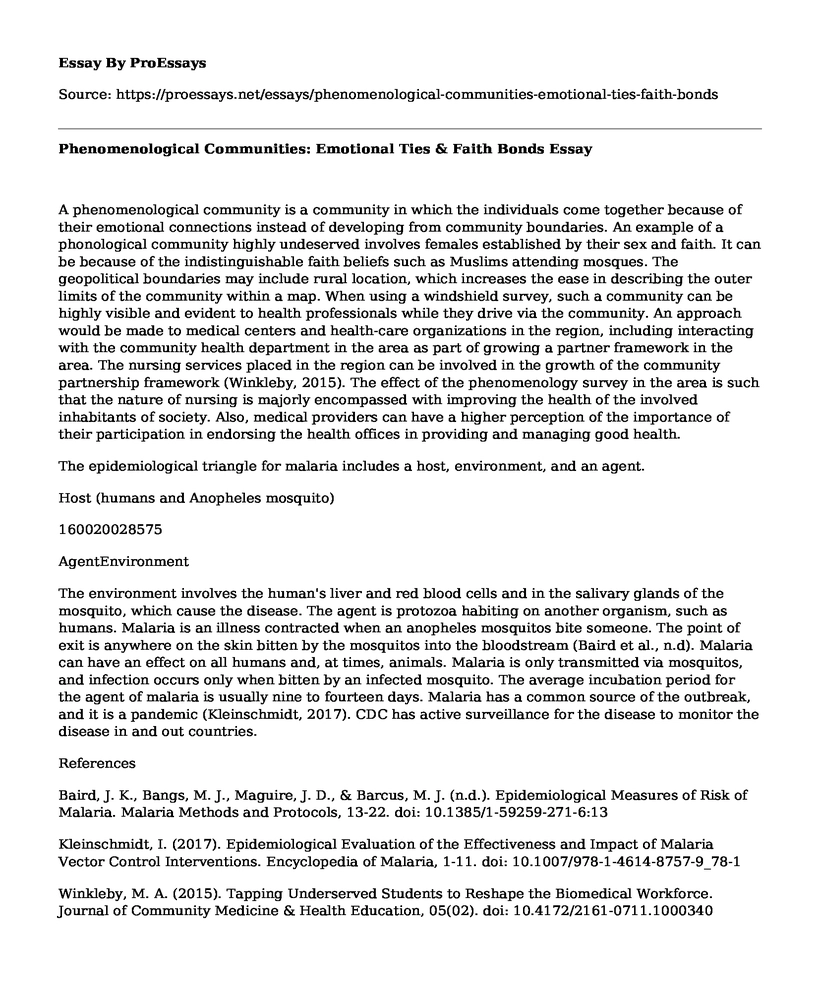A phenomenological community is a community in which the individuals come together because of their emotional connections instead of developing from community boundaries. An example of a phonological community highly undeserved involves females established by their sex and faith. It can be because of the indistinguishable faith beliefs such as Muslims attending mosques. The geopolitical boundaries may include rural location, which increases the ease in describing the outer limits of the community within a map. When using a windshield survey, such a community can be highly visible and evident to health professionals while they drive via the community. An approach would be made to medical centers and health-care organizations in the region, including interacting with the community health department in the area as part of growing a partner framework in the area. The nursing services placed in the region can be involved in the growth of the community partnership framework (Winkleby, 2015). The effect of the phenomenology survey in the area is such that the nature of nursing is majorly encompassed with improving the health of the involved inhabitants of society. Also, medical providers can have a higher perception of the importance of their participation in endorsing the health offices in providing and managing good health.
The epidemiological triangle for malaria includes a host, environment, and an agent.
Host (humans and Anopheles mosquito)
160020028575
AgentEnvironment
The environment involves the human's liver and red blood cells and in the salivary glands of the mosquito, which cause the disease. The agent is protozoa habiting on another organism, such as humans. Malaria is an illness contracted when an anopheles mosquitos bite someone. The point of exit is anywhere on the skin bitten by the mosquitos into the bloodstream (Baird et al., n.d). Malaria can have an effect on all humans and, at times, animals. Malaria is only transmitted via mosquitos, and infection occurs only when bitten by an infected mosquito. The average incubation period for the agent of malaria is usually nine to fourteen days. Malaria has a common source of the outbreak, and it is a pandemic (Kleinschmidt, 2017). CDC has active surveillance for the disease to monitor the disease in and out countries.
References
Baird, J. K., Bangs, M. J., Maguire, J. D., & Barcus, M. J. (n.d.). Epidemiological Measures of Risk of Malaria. Malaria Methods and Protocols, 13-22. doi: 10.1385/1-59259-271-6:13
Kleinschmidt, I. (2017). Epidemiological Evaluation of the Effectiveness and Impact of Malaria Vector Control Interventions. Encyclopedia of Malaria, 1-11. doi: 10.1007/978-1-4614-8757-9_78-1
Winkleby, M. A. (2015). Tapping Underserved Students to Reshape the Biomedical Workforce. Journal of Community Medicine & Health Education, 05(02). doi: 10.4172/2161-0711.1000340
Cite this page
Phenomenological Communities: Emotional Ties & Faith Bonds. (2023, May 30). Retrieved from https://proessays.net/essays/phenomenological-communities-emotional-ties-faith-bonds
If you are the original author of this essay and no longer wish to have it published on the ProEssays website, please click below to request its removal:
- Community Service - Giving to the Community in Need
- The Impact of Christianity on Western Civilization Essay
- Research Paper on Racial Discrimination in the Criminal Justice System
- Essay on Explore the Bustling City of Atlanta: 2018 Population, Economy, and Culture
- Essay Sample on Rich History of Carrollwood, Tampa Bay Area
- Essay Example on Sacrifice Zones: The Poorest Places in America
- Paper Sample: Fresh Graduate Pursues Master's in Electrical Engineering at KFUPM







